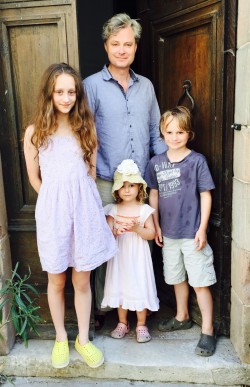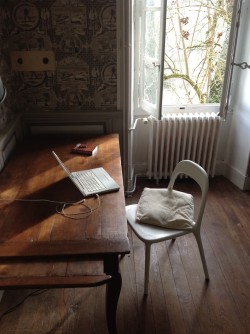International Thrills: An Interview with Simon Toyne
From French Citadels to the Arizona Desert
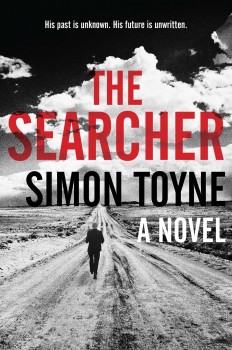 By J. F. Penn
By J. F. Penn
Simon Toyne is the author of the Sunday Times bestselling Sanctus trilogy, a genre-stretching, end-of-days epic involving ancient history, modern technology, religious conspiracy, and rollercoaster-quick storytelling. Often described as the British Dan Brown, Toyne has written books that to date have been translated into 28 languages and published in 50 countries.
USA Today bestselling thriller author J. F.Penn interviewed Simon for The Big Thrill. You can watch the video discussion here or read the transcript below.
First of all, just give us an overview of THE SEARCHER so that people have a sense of what it’s about.
Solomon Creed is a man on an epic journey of redemption. He arrives at the beginning of this first book, clueless as to how he’s got there, walking down the middle of an Arizona Road towards a town called Redemption. Behind him is a burning plane and he’s got emergency vehicles screaming towards him.
He knows nothing about himself at all. All he has is this sensation that he is there to save a particular man, whose name he knows. But as the police cars pull up and they start to check him over, he mentions this guy and says, “I think I’m here to save him.” And the Chief of Police says, “We buried him this morning.” So that’s how the book kicks off, and the central mystery is how do you save a man who is already dead?
I’ve read the Sanctus trilogy, which I absolutely loved. That series featured the town of Ruin and now you have Redemption. How important is sense of place to your writing and tell us a bit more about Redemption?
Sense of place is hugely important for me because environment forges character. So if you don’t have a sense of the environment, then you are missing a lot of tricks, really, as regards character and setting. With Ruin, it was kind of accidental. I really tried to find a place that would fit the story and I just couldn’t find one. There was nothing that quite worked and I felt really bad about taking a real place and taking too many liberties with it to try to make it fit my story.
So in the end, I just decided to create this new place, which was really hard. Because you have to create a whole history and mythology. You have to make sure it looks right, that the food is right, everything. So you’re grabbing bits from lots of real places to create this fantasy and make it feel real. Which is what you do with all of your fiction, really. Your characters are figments of your imagination, but you do whatever you can to make them feel real.
Watch Toyne’s video discussion here:
This time around, the whole notion of Solomon Creed is that you’re not quite sure who he is, or indeed what he is. Whether he’s delusional, whether he’s reincarnated, whether he’s an angel, whether he’s a devil, whether he’s just some drifting genius loser because he has enormous knowledge about the world but none about himself. I genuinely wanted to set it somewhere real. I thought, particularly if I’ve got this cipher of a character, it would be really good to put his feet on the ground somewhere real. And I loved Arizona and I liked that elemental walking out in the desert in the spirit of great Westerns. And so I went to Arizona.
I’ve been to Arizona before but never specifically looking for this kind of town. So I went there on a trip and spent a good couple of weeks going around taking pictures, really trying hard to find this very specific town. I thought I would because I did lots of pre-research and I had a hit list of places to go, ghost towns, ex-mining towns, all of which I knew needed to be part of the story. And again, none of them were quite right. They were all near misses.
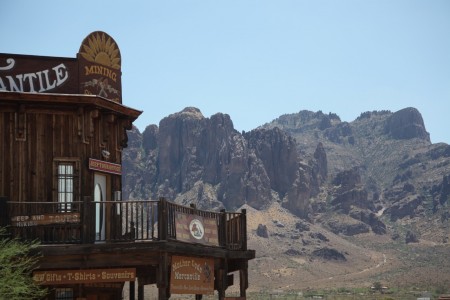
An Arizona mining ghost town, with Superstition Mountains in the background, served as inspiration for Toyne’s THE SEARCHER.
And I started feeling these pangs of “If I take such liberties with a real place, I’m going to get into trouble. I’m going to feel bad.” And also crucially, I would know it wasn’t real. So in a way, cutting myself loose and allowing myself to have total free rein in inventing a place snatched from lots of these bits, felt like the right thing to do. And it was in the end.
Ruin was a huge city with thousands and thousands of years of history. And Redemption has just got about 150 years’ worth. It came about at the time when Arizona stopped being a territory and started being a state and at the time when the copper came in. That is tied in with the story as well. It was quite nice to deal with history in recent memory, which was a change.
But place is hugely important for me. With the books you write, you need to place these things in very vivid environments. Otherwise, the fantasies we’re spinning just spin away a bit too much. You have to anchor it in something solid. So, it’s definitely crucial. And I spend as much time, if not more, on place, as I do on the characters.
You mentioned that environment forges character. So I wondered about your own environment and how that forges your character. As we’re talking, you’re in an unusual place, aren’t you? Tell us about that.
I’m in France, but that’s not that unusual. But perhaps how I got here is more interesting. I worked in television and I always wanted to write a book. But TV was fairly full on and I was an exec so I was quite high-level with lots of stuff to do. And I just didn’t have any free time. As I was approaching 40, I had a minor midlife crisis. I thought, “What am I doing? What happened to that novel that I thought I was going to do?”
So I quit. But I couldn’t just go in the spare room and try and bash out a book. I decided with my family that we would just go on an adventure. Because then if the book failed, at least we would’ve had an adventure, and I could sweep the book failure under the carpet of the adventure that we’d had. Because we spoke a bit of French and because France was handy and we could drive to it, we decided to hire somewhere in France. So we just picked a place, rented it, hired out our place in Brighton, and we moved here for six months. And I wrote a big chunk of what became Sanctus here. Ever since we ended up coming back here on holiday every summer. Even though we could’ve gone anywhere, we always ended up coming back here. And I always ended up being very inspired here and writing. I live in a little place called Cordes sur Ciel, which means Cordes on the sky.
It’s so cool because it’s a hill town in the middle of a valley. And in the morning the valley fills with mist and the top of the hill is just visible. So it looks like it’s floating on clouds. And whenever we came on holiday, I always have loads of ideas and I’d write loads. It was a very inspirational place. And so ultimately, what happened was we bought the place and I’m in it now.
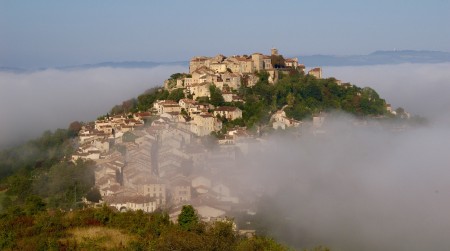
Toyne writes fiction in his house in Cordes-sur-Ciel, a town sitting high on a hilltop in Southern France.
My wife’s an interior designer so we always buy total wrecks, and when we bought this, there were about 50 pigeons living in the roof because the roof was like a colander and the electrics were lethal. Because I’m a full-time writer, we come here during all the kid’s holidays. I just carry on working, so we’re here for six weeks in the summer which sounds like the most brilliant holiday ever except they have six weeks of a lovely time and I just lock myself away in my room. So it’s just hotter, as far as I’m concerned, and the food’s nicer when I stop work. It’s gloomy here at the moment, not because the middle of the night, but because I’m sitting by an open window to get a bit of breeze and the shutters are shut because is 98 degrees, or something, out there at the moment. It’s just boiling hot. The kids are off down the road at a pool cooling off and being quiet and letting me work.
The opening scene of THE SEARCHER is a plane crash and there are lots of flames in the middle of the Arizona desert. So maybe that is shaped by your writing environment?
Actually, when I was thinking about the different books right from the beginning, I was considering how I could differentiate each book. At the moment it’s going to be a five book series, but it’s kind of open ended. I know who Solomon is, but when that is revealed is up for grabs, which is part of the fun of it because I don’t know where it’s going. I have waypoints that I know I want to reach with the stories. I thought one way to differentiate the first four books at least would be for the first one to be fire as an element, then water, earth, and air. Just those little things to give a tonal difference to each one of them in a color palette and all of those things.
The character of Solomon Creed is an old-fashioned Ronin, almost a samurai. He’s going to these places to fix something that’s out of kilter and then he can move on. And so he can go anywhere. So in the second book, he’s in France. Around here, actually. You write what you know and, as I said, it’s very inspirational for me here. It’s so beautiful and dramatic and it’s got lots of history, like the Albigensian Crusades flowed through here, made famous by Kate Mosse with Labyrinth, and it’s the Vichy area for the Second World War and capitulation. So there’s tons of history.
The name, Solomon Creed, is fascinating in itself. How did you come up with that name?
It just came to me. I struggle with names because names are really important and I often change the name of characters loads of times. And sometimes I might be having trouble writing a character and if I just really think about their name and change their name, it becomes easier because I had the name wrong. So it’s really important.
When I thought of the main idea for THE SEARCHER, the name, Solomon Creed, just came with it. And it was one of those things that just seemed so familiar that I was convinced I must’ve read it somewhere. So I looked it up and Googled it and checked stuff out but it didn’t exist. It was one of those things that just came ready formed. I like names and symbolism. And it’s got good connotations because Solomon’s an old name and the name of a wise king and creed means belief system. I think I’ve moved away slightly with this book from the more overtly religious underpinnings of the Sanctus trilogy. I mean, they’re there, but they’re not so overt. Whereas the trilogy was about relics that were the mysteries, in this book, Solomon is the mystery which was a whole different challenge. Actually, as a writer. I’ve discovered it’s difficult to write an enigmatic character on a page.
How much of you is in the character of Solomon Creed?
Especially with main characters, you spend such a long time with them and inevitably, bits of yourself bleed into them. But I think bits of yourself bleed into all of your characters, good and bad, in order to make them real.
I would say he’s more removed from me than most of my other main characters, just because he’s so otherworldly. I’m very chatty and he doesn’t say much. He’s a strong silent type. He keeps his own counsel and he’s very watchful. And again, that’s really hard to write. It was a real challenge. It was probably the hardest book I’ve ever written. It’s partly just because it felt like starting again. But also just because normally you know the center of your main character, you know what their core is. Even if they’ve moved away from it and they’re trying to get back to it, you know who, fundamentally, they are or if there’s a bit missing, what that bit is. So that that kind of dictates the narrative.
And with Solomon, he has no idea who he is. He knows literally nothing about himself whatsoever. He just arrives walking down the road, no shoes on his feet, wearing a nice jacket, walking away from a plane crash that he has no knowledge of being on, towards the town that all he knows about is that there’s this guy in there he needs to save. That’s all he knows. And yet he looks around and everything he looks at, like a cactus, he knows the Latin name of it, the medicinal properties, what the Hohokam Indians called it. He knows everything about everything. He has this deep medical, legal, and historical knowledge. He knows tons of stuff, but he has no idea how he knows it. And yet, when he thinks about himself, it’s just a black hole. So that’s what he’s trying to fill in. He’s very far removed from me, I think.
Part of the challenge was making someone so other and so uncentered feel real. The solution was by looking at him through all the other characters’ eyes. They make their own minds up based on their own situation. And so you get lots of different perspectives of him. And some people think he’s good, some people think he’s a troublemaker, some people think he’s an angel. Some people think he’s a double agent. It’s for you, the reader, to try and second-guess it.
You mentioned that THE SEARCHER isn’t as overtly religious as the Sanctus Trilogy, but there is still a religious history in the book and the church is very important. What other aspects will your current fans particularly enjoy?
There are more modern crime elements going on. It’s also written mainly in the third person with short chapters and a constantly changing point of view. It’s very cinematic. I did a degree in English but I studied screenplays as much as books. And that cinematic technique of having short chapters and changing points of view and third person so that the reader knows as much knowledge as possible is the best engine for telling a thriller and propelling the story forward.
There are lots of twists. There are lots of characters who you’re not quite sure whether they’re good or bad, they’re morally ambiguous so that you know they’re bad but somehow you like them because they are doing noble things. They’re doing bad things for good reasons. I love all that moral fog because it’s real. There are no really good people and there are no really bad people in the main. There is good in everyone, there is bad in everyone. That’s what makes it real. It’s also got a big twist reveal ending.
There is a difference between the UK and the US cover and title. Just talk a bit about that so people don’t get confused when they look for the book.
In America and Canada it’s called THE SEARCHER and has a very different cover—a man running down a road in Arizona. In the UK and Commonwealth countries, it’s called Solomon Creed. The cover is a black and white image of a man walking towards you. But it’s just one book. It’s not like I’ve been super productive and produced two books that are coming out within a month of each other! They’re both very great covers and the story’s the same. So hopefully it will find readers everywhere.
It’s a very visual book. Is there a chance of it being on TV?
The Sanctus trilogy remains un-optioned and is unlikely to turn into anything visual. But THE SEARCHER has been attracting lots of attention, various American studios, Hollywood studios, and it’s been one of those things where I’ve been dying to talk about it, but I haven’t been able to until now. I can reveal that THE SEARCHER/Solomon Creed has been optioned by Leonardo DiCaprio’s company, Appian Way for a TV series in conjunction with E1 which is a big producer of lots of fine dramas. So that’s very exciting. I’ve literally just signed the contract, but these things often take ages or go nowhere. It’s a very serpentine path to getting anything made. But I do think THE SEARCHER would be a really good TV series. I know I would say that, but it’s just very episodic and it’s split into 10 parts as well. So it’s almost ready made as a TV series.
What other thriller authors do you like reading?
I love Steve Berry. I don’t know that much about American history. You can read Steve Berry books and learn tons about American history because it’s so well researched. At the same time, he’s got this brilliant central character, Cotton Malone, and they’re really good thrillers that move along and twist and turn.
Greg Isles is a brilliant writer. His Natchez Burning is the first of a trilogy which is brilliant. It dots around in recent history, but it’s still in the South and that whole “Sins of fathers surfacing in the present” kind of stuff. He’s a very elegant writer, a very powerful writer.
I read a lot of Cormac McCarthy. Not strictly a thriller writer but No Country for Old Men has shades of thriller and crime. A lot of the deaths happen off the page. You gear up to it and then you cut to the aftermath with the marshal, which is brilliant. It’s a very original way of doing it, because he’s more interested in the aftermath, the consequences of violence than the violence itself.
*****
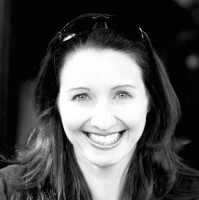 J. F. Penn is a New York Times and USA Today Bestselling Author of thrillers with a supernatural edge. Oxford educated, British born, she has traveled the world in her study of religion and psychology. She brings these obsessions as well as a love for thrillers and an interest in the supernatural to her writing. Her fast-paced ARKANE thrillers weave together historical artifacts, global locations, a kick-ass protagonist and a hint of the supernatural.
J. F. Penn is a New York Times and USA Today Bestselling Author of thrillers with a supernatural edge. Oxford educated, British born, she has traveled the world in her study of religion and psychology. She brings these obsessions as well as a love for thrillers and an interest in the supernatural to her writing. Her fast-paced ARKANE thrillers weave together historical artifacts, global locations, a kick-ass protagonist and a hint of the supernatural.
To learn more, please visit her website.
- AudioFile Spotlight: March Mystery and Suspense Audiobooks - March 17, 2025
- Africa Scene: Shadow City by Natalie Conyer - March 17, 2025
- The Ballad of the Great Value Boys by Ken Harris - February 15, 2025

